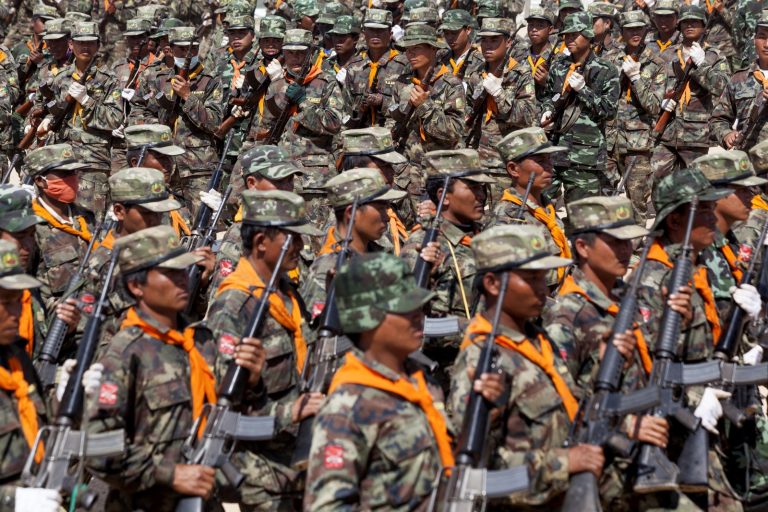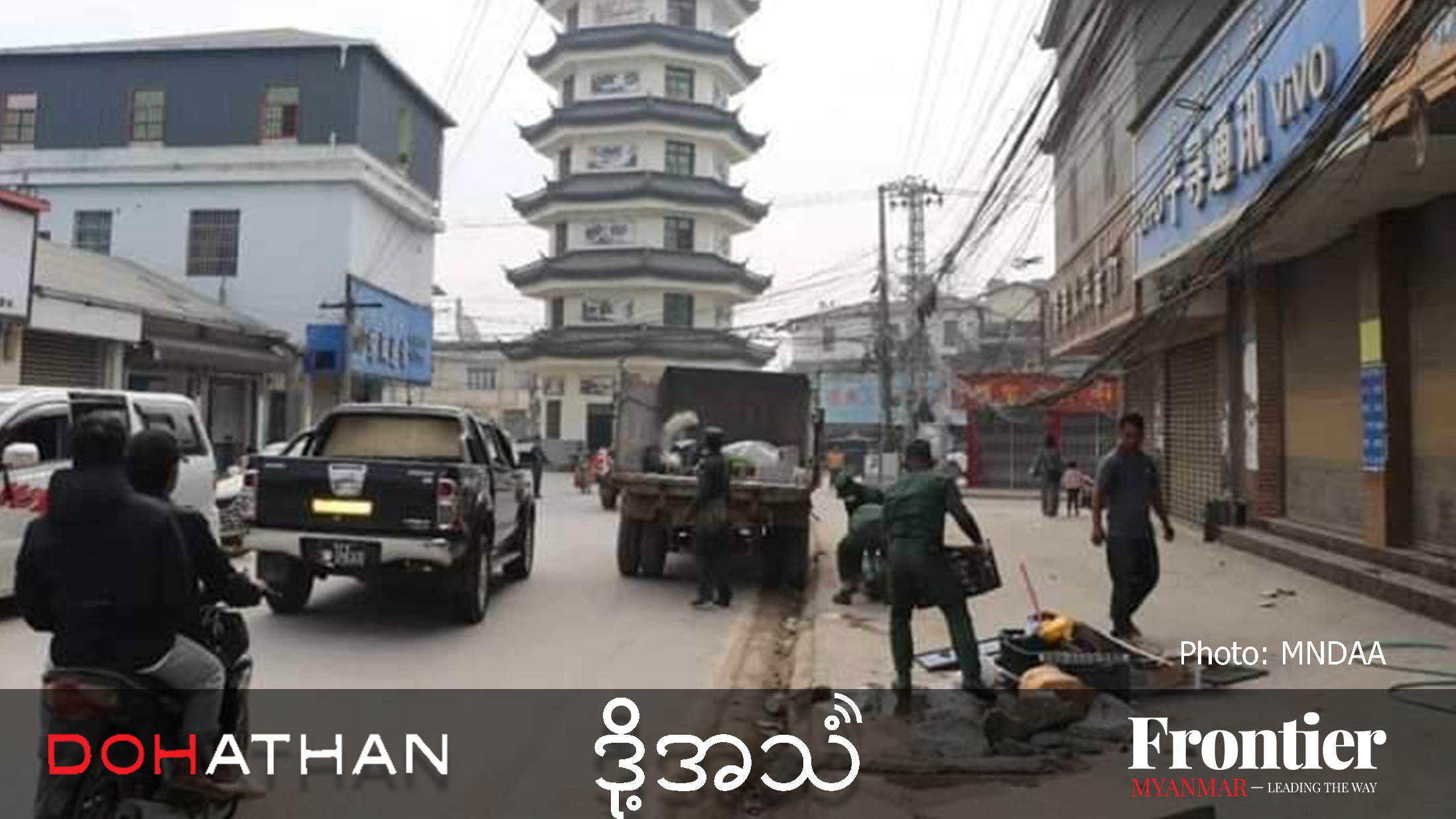Exploitation, drug abuse and an absence of labour unions make life precarious for migrant workers in the bustling border town of Muse.
By KYAW LIN HTOON | FRONTIER
MORE THAN A decade ago, U San Lin, 49, his wife Daw Wai Wai Myint and two sons moved from their village in Ayeyarwady Region to the Chinese border city of Ruili, opposite the busy Shan State trading town of Muse.
San Lin found work at a factory at Ruili but was exploited by its owner and after two years he decided to return to Myanmar and make a living in Muse.
A few months after settling down in Muse, his older son, aged 17, disappeared. San Lin and his wife learned from asking around in their neighbourhood that he might have returned to China to work because he wanted to help support his parents.
An increasingly worried San Lin reported his son’s disappearance at the township police station. He also returned to China with friends to search for his son, but their efforts were fruitless.
Support more independent journalism like this. Sign up to be a Frontier member.
San Lin said he and his wife were wracked with anxiety for months over their son, who remains missing, eight years after he disappeared. It’s possible their son is a victim of human trafficking.
“At that time, my wife had started selling mohinga in the market, but after our son disappeared she was not able to continue running her shop. As for me, I was drunk all the time because I couldn’t handle the situation,” San Lin recalled.
The need to care for their younger son helped San Lin and his wife to recover. As time passed, their emotional pain eased and they became more able to face the future.
What San Lin and is wife endured is not unusual among migrant workers in Muse. However, as the number of internal migrants in the town continues to grow, Muse-born residents are concerned about a lack of planning for the floating population.
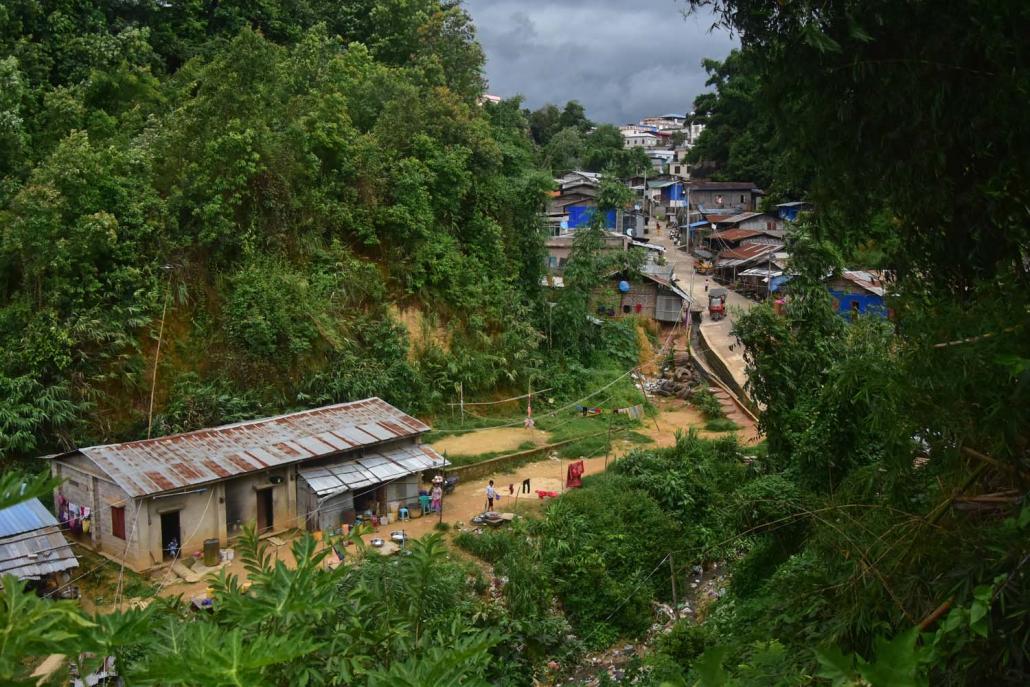
The Christian ward in Muse is home to much of the city’s large ethnic Bamar migrant worker population. (Kyaw Lin Htoon | Frontier)
Former Pyithu Hluttaw MP Sai Phoe Aung, who represented Muse for the Shan Nationalities Democratic Party, said the government needed to consider the issue because law and order in the township was deteriorating.
“The administration should address the possible effects of this growing migrant population because the crime rate keeps on rising, and it also needs to work for better living conditions for the migrants,” he said.
Residents, community leaders and politicians in Muse say most of the migrants are Bamar from upper Myanmar regions such as Sagaing, Magway and Mandalay.
Frontier observed during a visit to a ward populated mainly by migrant workers that most of its households were Bamar.
Most of the migrants lack the education or experience needed to find good jobs at factories in Muse, Ruili and the Chinese border trade zone of Jiegao, leaving them vulnerable to exploitation.
U Nyo Shan, 26, and his wife, Ma Zin Lay, 22, from a village in Sagaing, have been working in Ruili for more than three years.
Nyo Shan found work at a furniture factory and his wife at an orchid farm. They have a four-year-old daughter who was left in Sagaing in the care of grandparents.
In early July, Nyo Shan visited his wife at her workplace to discuss a plan to take leave and travel to Sagaing to visit their daughter and parents. When the Chinese boss of the orchid farm refused to grant leave to Nyo Shan’s wife, they decided to quit their jobs of three years.
“When we discussed my wife’s resignation with her boss, he said he did not want her to leave and if she did he would not return her identity documents, including her NRC [National Registration Card],” Nyo Shan told Frontier.
Nyo Shan, who can speak some Chinese, was angered by the man’s threat and they argued over the return of his wife’s ID documents. The couple eventually returned to Myanmar illegally across the Ruili River.
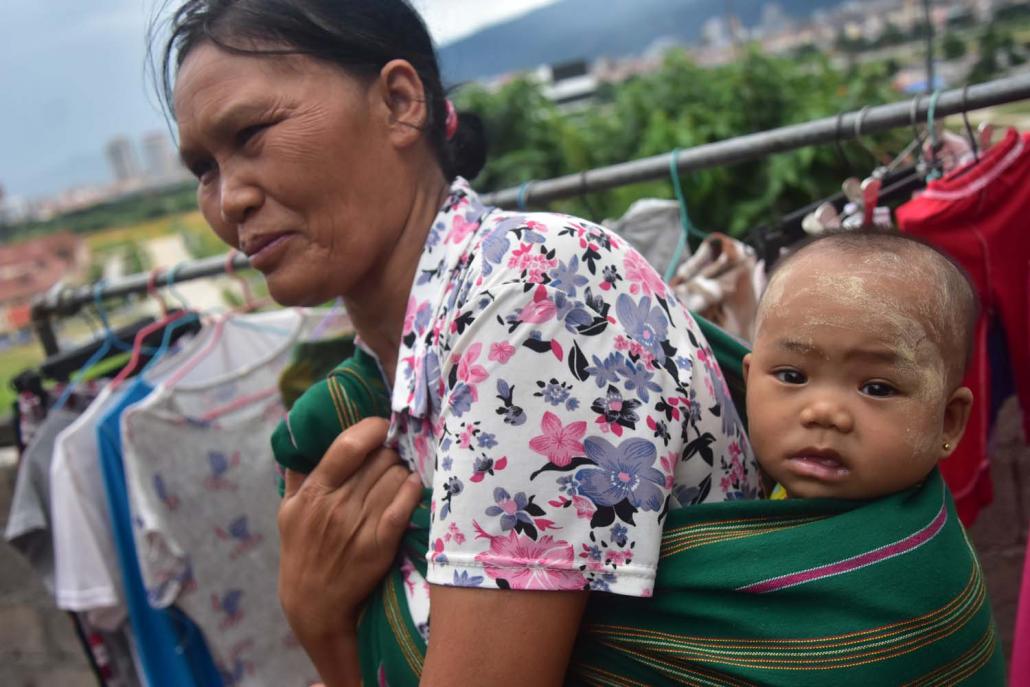
A migrant worker from central Myanmar walks through Muse with her granddaughter slung over her back. (Kyaw Lin Htoon | Frontier)
Another incident had also made Nyo Shan angry. It concerned a cousin who was working legally in Ruili and was, he says, accused of possessing drugs as part of a ruse to avoid paying him. Nyo Shan said his cousin admitted to taking drugs to get through overtime, but that his employer took advantage of his drug use.
Addiction to amphetamines, such as yaba, is a big problem among migrant workers in Ruili because they are so easily available. Amphetamines are a stimulant and some workers take them because they make long, arduous working days easier to tolerate. In some cases, migrant workers said they had started taking yaba at the suggestion of their Chinese employers and later became addicted.
Nyo Shan said both he and his cousin had the green cards costing the equivalent of K100,000 that allowed them to live and work legally in China. Nyo Shan said that when his cousin was arrested on drug charges he had not been paid for six months.
“Such tricks by Chinese bosses are not unusual if they don’t want to pay Myanmar workers,” Nyo Shan said. “They give the workers drugs like yaba and WY and they become addicted, then they call the police and you will be sent to jail.”
Nyo Shan once met his cousin at the prison in Mengyuexiang, about an hour’s drive northeast of Ruili. His brother told him that as a prisoner, he was forced to work on railway and road construction sites throughout Yunnan province alongside the other Myanmar prisoners.
There is no labour union in Muse, where many employers are Chinese. This means that if workers have a job-related problem and their boss is Chinese, they have to rely on someone who can speak Chinese well to negotiate on their behalf.
But some migrant workers have nothing but praise for their Chinese bosses. They include U Than, 52, who left Sagaing Region in 1999 and worked in Ruili for three years before moving 17 years ago to Muse. He lives there today with his family, in a ward known as Christian.
U Than says he has had good Chinese bosses. He first worked in Ruili delivering goods before being hired by a garment merchant to sort and pack consignments of clothing for delivery to Mandalay and Yangon. After working in that job for 10 years, U Than was recruited by a garment business in Muse to be supervisor of its packing department.
Asked if he and his migrant worker colleagues had ever discussed establishing a labour union to represent their interests, U Than replied: “What is a labour union?” After the role and function of labour unions was explained, U Than said there was no need for one in Muse.
“If we have a problem, the first thing we do is find a person who can speak Chinese or report the matter to the police,” he said. “But in most of the cases that occur on the Chinese side, it’s hard to get someone released because the authorities there tend to send people to jail. There are many Myanmar migrant workers in jails in Yunnan.”
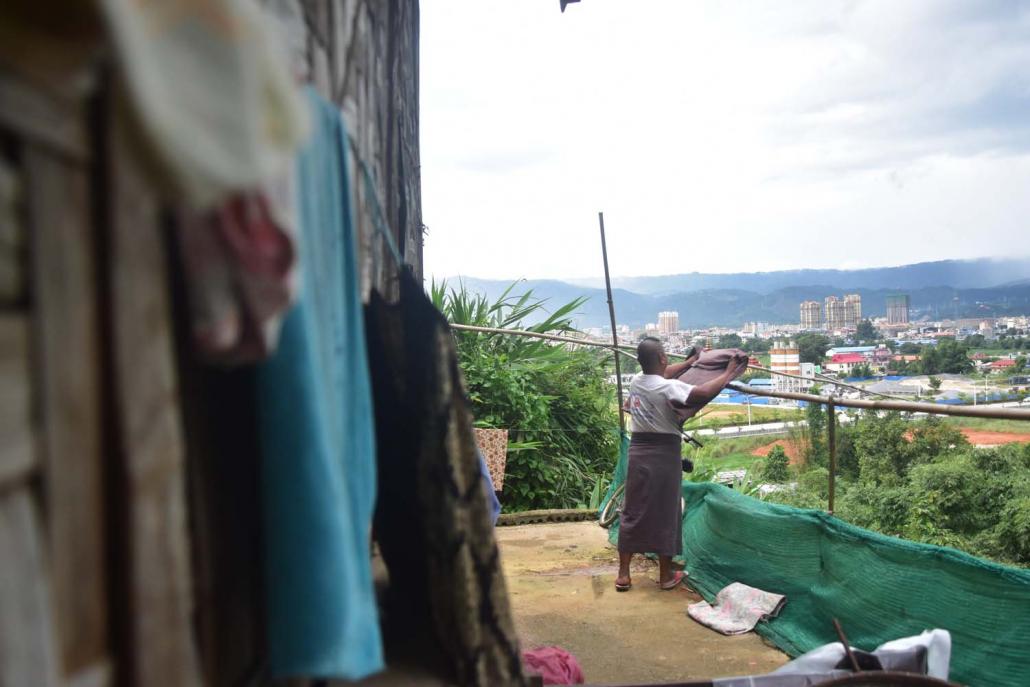
U Than, a migrant from Sagaing Region, hangs out a longyi to dry at his house in Muse’s Christian ward, with the modern buildings of the Chinese city of Ruili visible in the background. (Kyaw Lin Htoon | Frontier)
The police chief in Muse Township, Police Captain Aung Kyaw Oo, said crime rates were higher in Muse than other parts of the country because of its border location and the lingering effects of unrest in the area.
Fighting in Muse Township in late 2016 between a coalition of ethnic armed groups known as the Northern Alliance and the Tatmadaw claimed 16 lives, internally displaced more than 2,000 people and sent thousands more fleeing across the border to China.
Aung Kyaw Oo was unable to provide comprehensive data but said that migrant workers were responsible for most of the petty crime and illicit drug use in Muse.
“The biggest challenge for me in implementing the rule of law in this township is the floating population because most of the crime occurs in the wards in which they live,” he said.
Figures provided by Aung Kyaw Oo show that Bamar and Rakhine migrant workers accounted for nearly all of the 97 people arrested for drug use in Muse from January 1 to the end of July this year. In the same period last year, police in Muse arrested 28 people for using drugs.
Shan Nationalities League for Democracy MP Sai Kyaw Thein, who represents Muse-1 in the state hluttaw, welcomed the economic development and growth in his native township but said it was suffering from a lack of planning.
“We also need to grow our knowledge, attitude and thinking,” Kyaw Thein said, adding that Muse’s border location meant that it was more likely to be affected by human trafficking and the illicit drugs trade.
“The government should concentrate more on such problems, including the exploitation of labour. It also needs to provide more facilities and increase the capacity of the township’s administration so it is better able to address the issues affecting Muse,” he said.
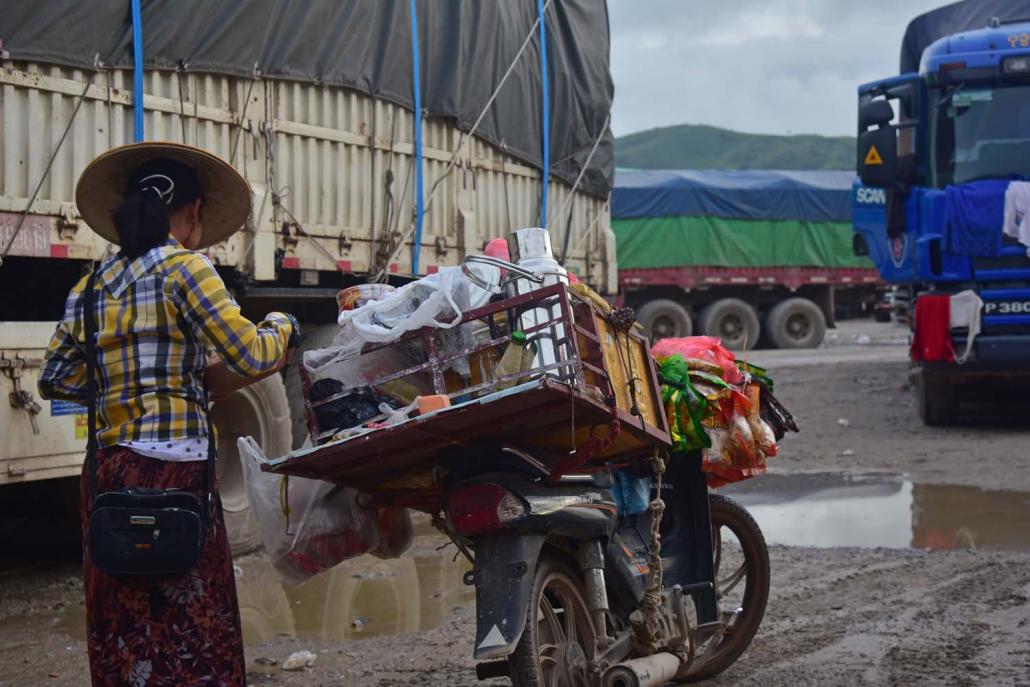
A migrant from Monywa sells snacks and drinks from the back of her motorbike at the 105 Mile trade zone south of Muse. (Kyaw Lin Htoon | Frontier)
Sai Kyaw Thein said the government also needed to work with China on measures to protect the rights of Myanmar migrant workers.
The experience of Ko Yan Nyein Aung, 26, illustrates the challenges that unskilled migrant workers can face trying to enter the fiercely competitive labour markets in Muse and Ruili.
Yan Nyein Aung, from a village in Magway’s Pauk Township, moved to Muse more than five years ago after dropping out of university. He had been studying at Magway University for a degree with a major in geography.
The decision to enroll at the university came after Yan Nyein Aung had worked in a supervisory role at a teak plantation in Bago Region for two years after passing his matriculation.
Yan Nyein Aung decided to leave the university and try to find work in Muse because he wanted to help support his parents, who were struggling to make a living as farmers. When he arrived in Muse he discovered that his education and work experience were of little advantage in its competitive job market. He had a series of unskilled jobs, including working on plantations and orchid farms, and as a labourer with pipeline repair teams.
About three months ago, Yan Nyein Aung returned to his village and married his childhood sweetheart. The newlyweds travelled to Muse with high hopes for the future. Yan Nyein Aung’s wife found work in a beauty salon in Muse but his efforts to find a job were fruitless so he started his own business delivering traditional Burmese food and snacks on his motorcycle to migrant workers on both sides of the border.
It’s risky because he crosses into the Jiegao border gate illegally, but crossing the border to earn an income is his only option for the time being.
“I don’t know what to do after this,” Yan Nyein Aung told Frontier recently as he was loading his motorcycle for another ride across the border to China.
“The income from selling the snacks and food is enough to cover the cost of living for me and my wife,” he said. “The Chinese authorities can arrest me and send me to jail at any time, but I just have to keep doing this for now.”



